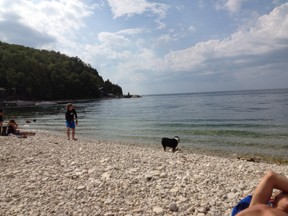Funding for Beach Monitoring Uncertain
- Share
- Tweet
- Pin
- Share
Wisconsin has been promised federal funds for programs that test for bacteria on Great Lakes beaches, but state DNR water resources management specialist Donalea Dinsmore still has her fingers crossed.
“It’s sort of like it’s in the mail,” Dinsmore said. “We have not been given the money yet. We understand that it’s coming and we are doing everything that is within our power… to make it possible for us to start the beach season in a reasonable way.”

Funding for the Beaches Environmental Assessment and Coastal Health (BEACH) Act, passed by the Environmental Protection Agency (EPA) in 2001, has traditionally paid for testing Great Lakes beaches, but in late 2012 was not included in the proposed federal budget. State and local municipalities started scrambling to make up the expected lost funds.
Now, more than six months later, federal programs have gone through a sequester and there’s still no national budget.
That uncertainty leaves Wisconsin in a tougher place than most states that receive BEACH Act money. Dinsmore said the EPA wants grant recipients to use money right away, and that’s what Wisconsin does while other states hold on to the funds to use for the next year. It’s always a fire drill to get our money out the door, Dinsmore said, and not knowing if we’ll have it for the upcoming beach season makes planning hard.
“While others have most of their funding available to operate for this season with their sampling, ours was spent last season with the exception of a very small amount,” Dinsmore said.
In the meantime, local communities were left to pick up the tab. Door County Health Officer Rhonda Kolberg sent letters to local municipalities asking for $1,000 contributions toward county beach monitoring, and received donations from most of them. She plans to offer the money back since federal funding will likely come through.
Door County has been promised $78,000 to cover the next two years of beach monitoring programs, compared to almost $60,000 for just 2012. With help from the University of Wisconsin – Oshkosh, Kolberg said the county can keep the same monitoring programs for the next two years.
“We’re very happy and we’re very thankful to the people and agencies and municipalities who donated,” Kolberg said. “We do need a stable source of funding – we’re good for two years now, but we’re going to see this all happen again. So we have to do some work to try to make sure we have stable funding.”
Dinsmore wouldn’t say how much the state was promised, but said it’s far less than usual. Wisconsin typically receives about $244,000 BEACH Act money annually, but will receive less this year and will have to stretch it over two beach seasons.
That means Dinsmore had to prioritize which beach monitoring programs are most important. Funding first goes to the website that informs swimmers about beach closures wibeaches.us), then to popular swimming beaches, then to the Nowcasting program, then to medium- and low-priority beaches.
The department is testing Nowcasting programs, which use weather and local data to predict when beaches will be unsafe for swimming. That way beach managers can close beaches sooner, without having to run water samples to a lab to check for germs.
Fifteen beaches in Wisconsin are testing Nowcasting programs, and Dinsmore wants to get the program set up as soon as possible so the state can monitor more beaches with less cash.
Dinsmore also applauded Door County for investing in beach renovations that allow runoff to filter before dumping into beaches.
“Door County has done a wonderful job in investing in really restoring the beaches to a more natural condition that will help them stay safer,” Dinsmore said. “But people have to understand that they contribute to safe clean beaches, and things like litter and feeding the birds and those things are all important aspects of maintaining a beach that does not have excessive bacteria.”
At this point, Dinsmore is optimistic about receiving the BEACH Act funding promised to coastal and Great Lakes states, although a question about when she’ll be sure caused some nervous laughter.
“It’s Band-Aids and duct tape and wishes and prayers, and a little holding my breath,” Dinsmore said.
Read more: BEACH Act Funding Cut

